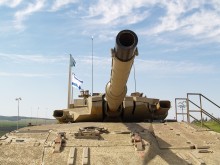 This week Egypt stepped into a new era: A civilian Islamist was named president. Former Muslim Brotherhood chairman Mohamed Morsi is clearly not Hosni Mubarak. The cold peace between Israel and Egypt has been getting colder and colder ever since Mubarak was pushed out of power by the revolution.
This week Egypt stepped into a new era: A civilian Islamist was named president. Former Muslim Brotherhood chairman Mohamed Morsi is clearly not Hosni Mubarak. The cold peace between Israel and Egypt has been getting colder and colder ever since Mubarak was pushed out of power by the revolution.
But will Morsi turn cold peace into cold war? Will Egypt turn into another Iran? The answer may actually matter less than the response, which is best summed up by an old quote: “The price of peace is eternal vigilance.”
A quick gut reactions to Morsi’s election is unwise. Hailing him as proof Egyptian democracy worked and claiming governance will automatically demand moderation in his leadership ignores regional history. Being terrified and believing ties should be cut immediately with the former leader of a formerly vicious terrorist group is also shortsighted. Peace was expensive to achieve and shouldn’t be tossed aside preemptively.
The best response is to follow the brief quote above from G. P. Gooch and keep both eyes open always. The reality is we don’t know what Morsi will do in every instance, and at this point he may not either.
A perfect example of the ambiguity surrounding Morsi are his views on Coptic Christians in Egypt and women. On the one hand, it would appear historically he has approached these issues from the viewpoint of fundamentalist Islam.
The English-language Egypt Independent news website wrote an interesting article on Morsi in which they quoted an opponent as saying he backed and even defended the Muslim Brotherhood’s political platform in 2007 that women and Copts could not be president. The Brotherhood later dropped that political stance after the toppling of Mubarak.
Yet on Monday, Morsi’s policy adviser informed CNN that a woman and a Copt would be named vice presidents.
So who is Morsi? Will he uphold the peace treaty with Israel, as Al Jazeera inferred that he would based on a speech to state television in which he said he would “keep all international treaties”?
Or will he act more on his comments from a year ago recently republished by Ynet where he accused Israel of possibly working with remnants of the old regime to “destroy the revolution, and with it all of Egypt”?
Ultimately, generic klonopin pictures Morsi has millions of reasons not to break the peace treaty with Israel: the financial aid given Egypt by the United States following the signing of the historical Middle East pact. The US has given billions of dollars to Egypt over the past three decades, and that’s money the economically-struggling Egypt can’t just throw away.
Furthermore, Egypt has been an ally for the West in the region for years, particularly against Iran. Switching horses midstream from the West back to the old Russian-Eastern alliance wouldn’t come without difficulty and diplomatic crisis.
Egypt, right now, is not in a place to endure crisis. They’re still figuring out how their government will even function legally and the tension between the revolutionaries and ruling military council is palpable.
Diplomatically, they’re still getting their legs. And there are so many other crises in the Middle East right now, it’s doubtful Egypt will want to risk getting dragged into one. Put simply, Morsi needs to focus on home before he can think about neighbor Israel.
That being said, the need for vigilance is extremely significant. The US should keep Egypt on a short leash. If there’s a sign of re-inventing the peace treaty with Israel, or arming Hamas in Gaza, or true rapprochement with Iran, then the US ought to threaten to withdraw funding. If necessary, they should carry through on that threat. It has worked before.
For Israel, they need to be as diplomatic as possible while preparing for any scenario. In a world of limited resources, Egypt ought to be lower on the list than Lebanon or Iran, but it still needs to be on the list somewhere. It’s no longer a given the next-door country will be friendly. Contingencies for what to do if Hamas does start getting real weapons via Egypt is another serious concern.
It’s a delicate balance for sure—preparing for the worst without inadvertently escalating into it. Hence, putting tanks on the border would be a mistake. Building extras, just in case, would be wise.
But for now, peace should prevail. Eternal vigilance is an expensive price to pay for it, but peace is worth keeping.
(By Joshua Spurlock, www.themideastupdate.com, June 26, 2012)
